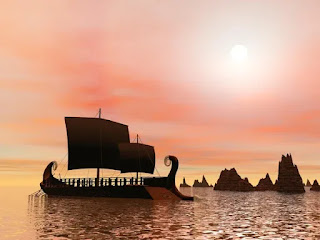Perpetual Becoming
"Am I still me, the same me?" This is a question I often find myself pondering, and it's something we all struggle with, perhaps more often than we care to admit. It's a personal question as old as philosophy, captured perfectly in the ancient Greek thought experiment called the Ship of Theseus.
According to Plutarch's tale, the ship that carried the Athenian hero Theseus was kept in the harbor as a memorial and maintained meticulously. Over time, as decay took hold, each component was replaced with a new one. Eventually, there was no piece of the original ship left. This prompts the question: was it still the same ship? If we reassembled all the discarded parts, which ship would be the authentic Ship of Theseus?
I encountered many changes and transitions in my life, each acting as a metaphorical plank in my ship. I've been a son, brother, father, husband, insurance executive, teacher, student, friend, relative, athlete, Greek, American, and so on. The list is endless for me, as it is for the reader. In the constant flux of life, it's easy to ask, "Who is the real me?"
Decades ago, I set my sights on a classroom - the family "business" - dreaming of molding young minds as a teacher. But as it often does, life steered me down a different path, and I found myself climbing the corporate ladder in the insurance industry. Did this deviation from my original goal make me less of a teacher?
My dreams also included visions of athletic grandeur. I moved to San Diego at 23, believing that success as a triathlete was within my grasp. Though I did not become a professional athlete, does it mean I lost the essence of an athlete within me?
A part of my identity is deeply rooted in Greece. I grew up in Athens, speaking the language and immersing myself in its culture. However, when I returned to the U.S., I consciously decided to distance myself from my Hellenic roots. At the time, it seemed challenging to interlace Greek and American identities. But did this conscious disassociation indeed negate my Greek identity?
Years later, I faced an awakening. In my 40s, I realized I had not lost my Greek heritage but merely stored it away, packaged in some box. With substantial regret for my past decision and dedication to change, I resurrected my fluency in Greek and embraced my identity as a Greek-American. Does this imply that the essence of my Greek identity remained intact throughout, or was it rebuilt with new parts?
I am 56 now and find myself entranced by the beauty of the Greek language, dedicating hours to studying it. Each Greek word that rolls off my tongue is a testament to a piece of my identity that I had once thought was lost but have since discovered was only waiting to be found, an old plank in the sea.
Yet, our journey through identity is often complicated by societal expectations. We live in a world that constantly seeks to define us by what we do, to fit neatly into a preconceived box. "What do you do?" is often the first question we're asked at social gatherings, as if our professions fully define who we are. Rarely are we asked the more profound question: "Who are you?"
As our identities evolve, those around us must adjust their perceptions, often leading to discomfort. It challenges the neatly wrapped packages people create in their minds. The label of 'teacher,' 'executive,' 'athlete,' or even 'Greek' does not fully define the whole of my being. We are more than labels; we are a culmination of our experiences, choices, passions, and journeys.
The Ship of Theseus presents a riddle about identity and change. But, in reality, the question it asks is not about the ship but the observer. Like the ship, identity is not a static concept but a dynamic one, ever-changing and ever-evolving. The essence of who we are remains constant, like an indelible mark on our souls. Whether we identify as X, Y, or Z at any given moment is a part of our journey, not our destination.
So, do we genuinely need labels to define ourselves? Are we not more than the sum of our parts? The beautiful complexity of our identities cannot be reduced to mere labels. Our identities are, in essence, our own Ship of Theseus – a vessel in constant flux, yet always, irrevocably, us. As we sail through the sea of life, we remain captains of our ship, charting the course through calm and storm and defining ourselves not by the parts that have been replaced but by the journey we undertake.
